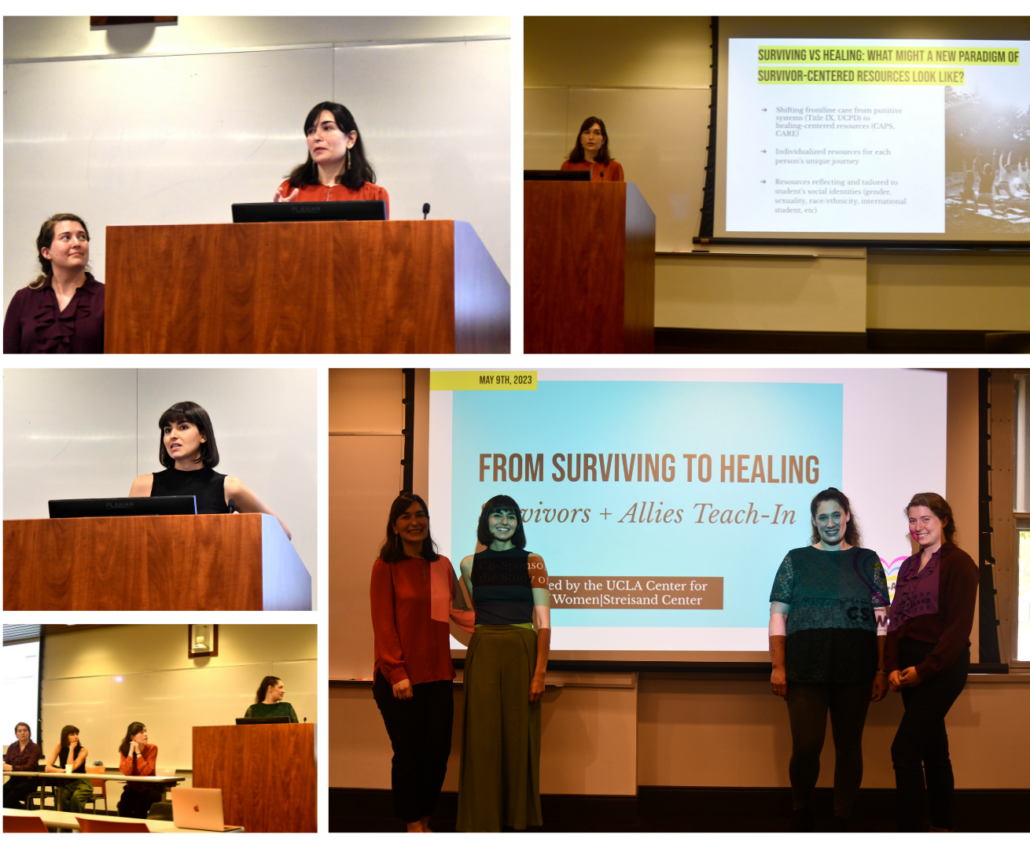Survivors + Allies: Teach-In Recap

On May 9, 2023, the UCLA Center for the Study of Women|Barbra Streisand Center and Survivors + Allies hosted a teach-in to share the results of a UC-wide research study. The teach-in shared Survivors + Allies’ findings from a UC-wide survey of students on their experiences with campus-based and off-campus resources for survivors of sexual violence. The panel consisted of UC graduate students Selene Betancourt, Margot Brooks, Stephanie Thorne, and Sara Wilf.
The panel discussed Title IX and its limitations. Title IX is a federal civil rights law that prohibits discrimination on the basis of sex in educational institutions that receive federal funding. Because sexual harassment and sexual violence can constitute discrimination on the basis of sex, these fall under the scope of conduct that Title IX regulates. Title IX creates a legal requirement that schools respond to reported incidents of sexual harassment and sexual violence as well as remedy “hostile educational environments” that may result from their occurrence. Stemming from this requirement, Title IX establishes procedural standards for the grievance processes, including the reporting of incidents, investigatory actions, and disciplinary measures, that are administered through a school’s Title IX office. While the broad purpose of Title IX is to provide the right to education free from sex-based discrimination, with respect to its navigation of sexual harassment and sexual violence, Title IX is largely a punitive system. Its focus is on deploying institutional authority to investigate and discipline. Title IX does little to center the needs and agency of survivors. For example, there is currently no mental health resource built into the Title IX process. While survivors can request “supportive measures” from the school, which can include assistance locating such resources, the burden of initiating this typically falls on survivors. The investigative process, interactions with Title IX investigators who are not trauma-informed, and other aspects of the process have re-traumatized survivors.
Additionally, the survey findings showed that student awareness of confidentiality is low. At the UCs, some resources are confidential, including resources offered by the Campus Assault Resources & Education (CARE, meaning that they will not share information provided to them by survivors or file a legal report. Other resources are non-confidential (Title IX), and are mandated to file a report if a student discloses certain types of incidents of sexual violence or gender discrimination, which may or may not turn into an investigation. Ultimately, Title IX coordinators can decide to open investigations without survivors’ consent.
The panel reflected on the question of surviving versus healing: What might a new paradigm of survivor-centered resources look like at the UCs? Their recommendations included shifting frontline care from punitive systems (Title IX, UC Police Department) to healing-centered resources (Counseling & Psychological Services CAPS, CARE), and offering resources reflecting and tailored to students’ social identities (including gender, sexuality, and race/ethnicity and being an international student).
Survivors + Allies concluded with a list of demands for the UCs:
- Increase CARE funding and provide a CARE advocate at all Title IX intake meetings, similar to a medical chaperone model, which is already in place at UC student health centers
- Increase number of CAPS therapists and hire more diverse therapists
- Provide additional healing resources for marginalized students
- Improve trainings and communications around resources for survivors
- Remove UCPD as a frontline resource
Survivors + Allies is a student organization that advocates for, and with, survivors of sexual violence at the UCs. Our work spans research, advocacy, and policy to create change and shift how society thinks about sexual violence. Stay up to date by following Survivors + Allies on Instagram.
Teach-in Resources
- Download the teach-in presentation
- Survivors + Allies demand letter to UCLA Title IX to cease collecting sensitive information about survivors through Title IX trainings
- Syllabi statement on the UC Speaks Up website
- Responses from the Mentimeter group visioning activity

